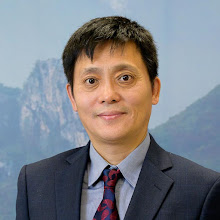Irritable
bowel syndrome (IBS) is a common, chronic disease. IBS occurs in 10-20% of the population in the UK, but
prevalence is thought to be higher than this as many people with the disorder do
not seek medical advice.[1] If you
often have unexplained diarrhoea and /or constipation accompanied by abdominal
pain and stressed mood, you may suffer
from IBS, and should contact your GP. IBS diagnosis can be confirmed by
exclusion using stools test, blood test and colonoscopy results.
Western medicine usually focuses on
the symptoms for IBS patients. Antispasmodics can relieve abdominal pain and cramping and antimotility agents can relieve diarrhoea.
Laxatives can relieve
constipation and anti-depressants can
relieve stressed moods. All of these medicines only can release symptoms
temporarily. It is difficult to cure the IBS from the root. Many patients have
to live with IBS for many years.
According
to the philosophy of traditional Chinese medicine depression and stressed mood
was due to liver qi stagnation, and diarrhoea and constipation were due to
spleen deficiency. If the diarrhoea were triggered by emotional stimulation,
the Chinese medicine diagnosis should be “liver restrict spleen” or “disharmonious
between liver and spleen”. The treatment principle for this condition must be dispersing
the depressed liver and benefiting the spleen. The basic classic formula is
Sini San, a prescription which has more than 1700 years history for diarrhoea
treatment. Alternatively we also can use modified Senling Baizhu San and
Tongxie YaoFang according to patient’s symptoms for individual cases.
In a pharmacological research to investigate the effects of
Sini San and fluoxetine on the levels of central and peripheral 5-HT in a rat
model of depression, the result showed that after eight weeks Sini San
treatment appeared at least as effective
as fluoxetine. It suggested Sini San can replace fluoxetine in the later stages
of depression treatment to minimize side effects of this anti-depressant[2]. In another
report from my ex colleague’s research team, it showed Shenling Baizhu
San suppresses colitis associated colorectal cancer through inhibition of
epithelial-mesenchymal transition and myeloid-derived suppressor infiltration[3].
Baishaoyao (Paeonia lactiflora Pall) is a common ingredient of these three
formulas. In in-vitro and in-vivo studies showed it has a beneficial effect of
Anti-inflammatory and immunomodulation[4]. With regard to the
pathophysiology of IBS a recent report indicated that low-grade mucosal
inflammation and immune activation were involved.[5] Based on
thousand years clinical experience of Chinese medicine and modern scientific
research, we have enough reasons to try Chinese medicine in IBS treatment.
Acupuncture and moxibustion also have good effect on IBS if a
good protocol is selected. Although there is much evidence indicating that
acupuncture works well on IBS,[6] unfortunately NICE did not
recommend acupuncture in their clinical guidance. Maybe their decision based on
different treatment protocols.
The advantage of TCM is to combine herbs and needles. The
treatment effect of herbs and acupuncture can enhance each other. Chinese
medicines tend to cure the disease from the root and not just
control the symptoms.
References:
1. Guidelines on the
Irritable Bowel Syndrome: Mechanisms and Practical Management;
British Society of Gastroenterology (May 2007)
2. Li Y. Effects of Sini San used alone and in
combination with fluoxetine on central and peripheral 5-HT levels in a rat
model of depression. J Tradit Chin
Med. 2013 Oct;33(5):674-81.
3. Lin X. Shenling Baizhu San supresses colitis associated
colorectal cancer through inhibition of epithelial-mesenchymal transition and
myeloid-derived suppressor infiltration.BMC Complement Altern Med. 2015 Apr 22;15:126.
4. He
DY. Anti-inflammatory and immunomodulatory effects of paeonia lactiflora pall, a traditional Chinese herbal
medicine. Front
Pharmacol. 2011
Feb 25;2:10
5. Holtmann GJ . Pathophysiology of irritable bowel syndrome.Lancet Gastroenterol Hepatol. 2016 Oct;1(2):133-146.
6. Xiao-Peng Ma.
Acupuncture-moxibustion in treating irritable bowel syndrome: How does it work?
World J Gastroenterol. 2014 May 28;
20(20): 6044–6054.


No comments:
Post a Comment